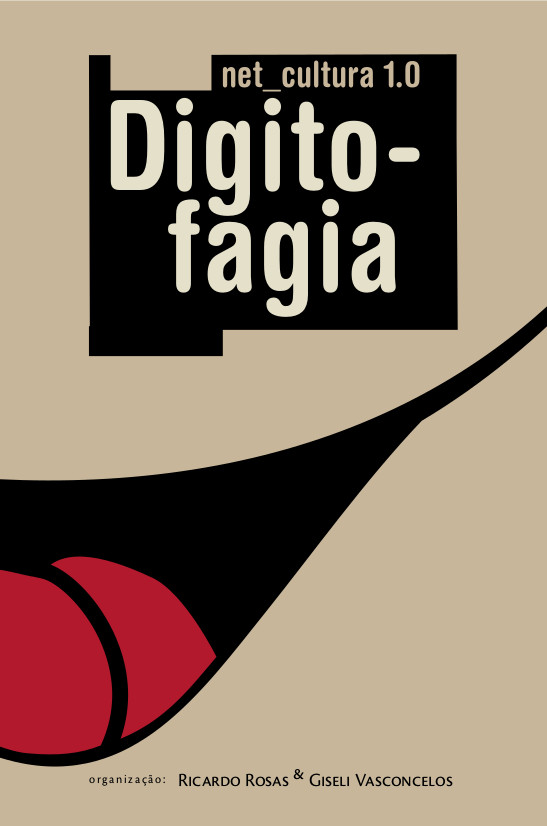Ricardo Rosas, Giseli Vasconcelos (eds.): net_cultura 1.0: Digitofagia (2006) [BR-PT]
Filed under book | Tags: · activism, anthropophagy, art, brazil, cyberfeminism, digital culture, hacktivism, media activism, politics, tactical media, technology, web

A collection of essays contextualizing actions and initiatives in Brazil’s net culture and hacktivism, edited by the late Ricardo Rosas and Giseli Vasconcelos and coming out of their experience creating Festival Digitofagia in 2004.
“Digitofagia é resultado de um processo coletivo de pensamento gerado durante a concepção, planejamento e realização de um festival de mídia tática, no Rio de Janeiro e em São Paulo, no ano de 2004, que discutiu, entre outras coisas, a necessidade urgente de “abrasileirar” práticas de mídia-ativismo que até então eram teorizadas, praticadas e planejadas sob a influência de teorias e práticas aparentemente alheias ao contexto brasileiro.
A concepção de Digitofagia foi pensar uma pratica antropofágica que se reatualiza no contexto da cultura digital, reabastecendo seu viés libertário. Para tanto, abraçar práticas espontâneas na cultura contemporânea brasileira, como a pirataria, os camelôs e a gambiarra, seria, quem sabe, formas de trazer a mídia tática para um campo mais familiar e mais cotidiano aos praticantes, teóricos e activistas brasileiros. Afinal, a própria cultura brasileira é um codigo (em) aberto.”
“Composto por 35 textos de escritores, ativistas, pesquisadores, acadêmicos e artistas preocupados com os caminhos do ativismo político-artístico nos tempos da globalização digital, Digitofagia é fruto da inesgotável energia e alegria de Ricardo Rosas (1969-2007), que primeiro pensou e organizou, ao lado de Giseli Vasconcelos, os textos selecionados para este volume.”
Publisher Radical Livros, São Paulo, with Sarai/CSDS, Delhi, and Waag Society, Amsterdam, 2006
Creative Commons BY-SA-NC 2.5 Brazil
ISBN 8598600048, 9788598600048
347 pages
Commentary: Paul Keller (2009), Geert Lovink (2009).
Comment (0)Addie Wagenknecht, et al.: Deep Lab (2014)
Filed under book | Tags: · art, cyberfeminism, digital culture, feminism, internet, media infrastructure, privacy, security, surveillance, technology, web

“Deep Lab book is a compilation of reflections on digital culture, the post-Snowden Internet, and cyberfeminism. Created in five days by a dozen women, it represents the capstone to Deep Lab, a congress of cyberfeminist researchers, organized by Frank-Ratchye STUDIO Fellow Addie Wagenknecht to examine how the themes of privacy, security, surveillance, anonymity, and large-scale data aggregation are problematized in the arts, culture and society.
During the second week of December 2014, the Deep Lab participants—a group of internationally acclaimed new-media artists, information designers, data scientists, software engineers, hackers, writers, journalists and theoreticians—gathered to engage in critical assessments of contemporary digital culture. They worked collaboratively at the STUDIO in an accelerated pressure project, blending aspects of a booksprint, hackathon, dugnad, charrette, and a micro-conference. The outcomes of this effort include the visualizations, software, reflections and manifestos compiled in this book; an album of ten lecture presentations, the Deep Lab Lecture Series; and a documentary film featuring interviews with the Deep Lab participants.”
By Addie Wagenknecht, Allison Burtch, Claire L. Evans, Denise Caruso, Harlo Holmes, Ingrid Burrington, Jillian C. York, Jen Lowe, Kate Crawford, Lindsay Howard, Lorrie Faith Cranor & CUPS, Maddy Varner, Maral Pourkazemi, and Runa A. Sandvik.
Publisher Deep Lab and Frank-Ratchye STUDIO for Creative Inquiry at Carnegie Mellon University, Dec 2014
Creative Commons BY-NC-SA 4.0 License
ISBN 978-1-312-77551-0
234 pages
PDF, PDF (109 MB, updated on 2018-4-14)
Deep Lab Lectures Series (10 videos, Dec 2014)
Documentary (18 min)
Ada 5: Queer Feminist Media Praxis (2014)
Filed under journal | Tags: · activism, archive, art, cyberfeminism, feminism, gender, media, praxis, queer theory, technology

“Alexandra Juhasz’s work on feminist media praxis together with Aristea Fotopoulou’s work on contemporary digital media, feminism and queer studies structured the theme of this issue. We were interested in exploring what the concept of praxis could offer in our thinking about the intersections of gender, digital media, and technology. Praxis in both Marxist and in Arendtian political thought brings together theory, philosophy and political action into the realm of the everyday. Inspired from this premise, and continuing the conversations that started during the workshop, we focus here on the conditions for a queer feminist digital media praxis.” (from the Introduction)
Ada: A Journal of Gender, New Media, and Technology, Issue 5
Edited by Aristea Fotopoulou, Kate O’Riordan, and Alexandra Juhasz
Publisher University of Oregon Libraries
Creative Commons Attribution-NonCommercial-NoDerivs 3.0 Unported License
ISSN 2325-0496
HTML
HTML (at Fembotcollective.org)

